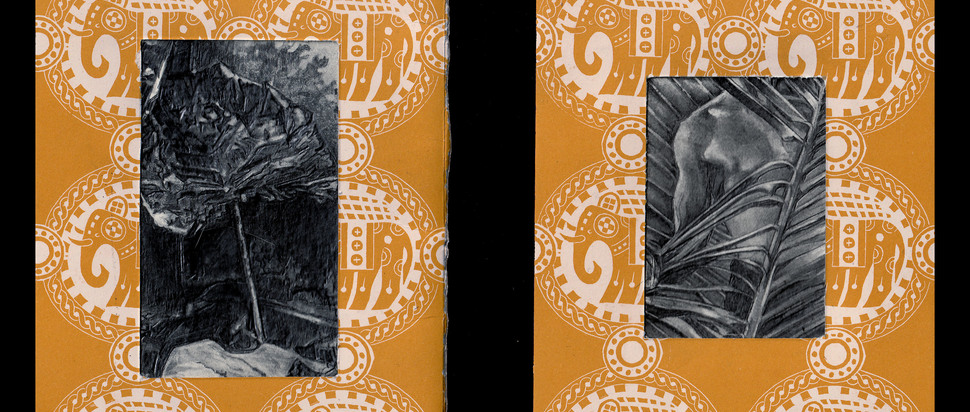Edinburgh Art Festival: Platform 2023 preview
Edinburgh Art Festival has announced the details of its annual Platform exhibition, celebrating the work of four Scotland-based emerging artists
Returning in 2023 for its ninth year, this year’s Platform cohort of artists promise to provide some of the most exciting, dynamic and rousing work at Edinburgh Art Festival, touching on colonial histories and global mythologies. Looking largely beyond Scotland’s borders for inspiration, artists Aqsa Arif, Crystal Bennes, Rudy Kanhye and Richard Maguire have been selected to exhibit work during this year’s festival.
Based in Glasgow, Aqsa Arif works with film, writing, printmaking and photography, forming complex installations that explore the nuances of dual heritage and cultural dissonance. Arif says that film, which initially helped her to navigate a new culture when she arrived in Scotland, now serves her "ongoing exploration of my inner and outer worlds", a way of expressing "personal and intergenerational trauma." Arif describes the work for Platform as revolving around "two distinct Pakistani female archetypes, the heroines from the folk tales: the Seven Queens of Sindh who promoted moral fortitude against all odds and the Tawaif, a sophisticated courtesan and entertainer during the Mughal Empire."
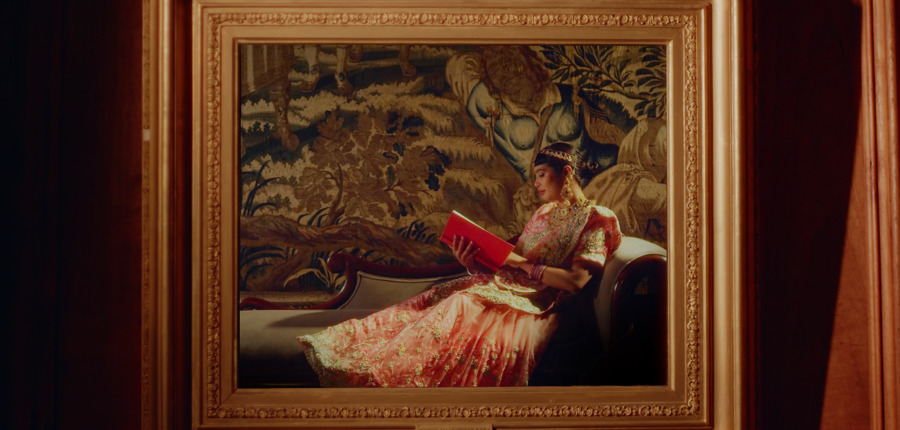
Still from Spicy Pink Tea by Aqsa Arif. Image courtesy of the Artist
Arif often uses characters and avatars from their poetic narratives, installing them in a fantasy space of free and safe expression, where uncomfortable conversations can play out. The artist’s interest in fantasy is seen in her stunning 2022 film Spicy Pink Tea, where a young Pakistani girl fantasises about that upper class life through the paintings that surround her in a grand but desolate stately home.
Crystal Bennes’s practice is rooted in archival research and meticulous fieldwork. For Platform, the artist will explore the English colonisation of Ireland, and its historical and contemporary repercussions. This is examined through a series of propositions from the 17th century by English colonists for the ‘transmutation’ of the Irish population.
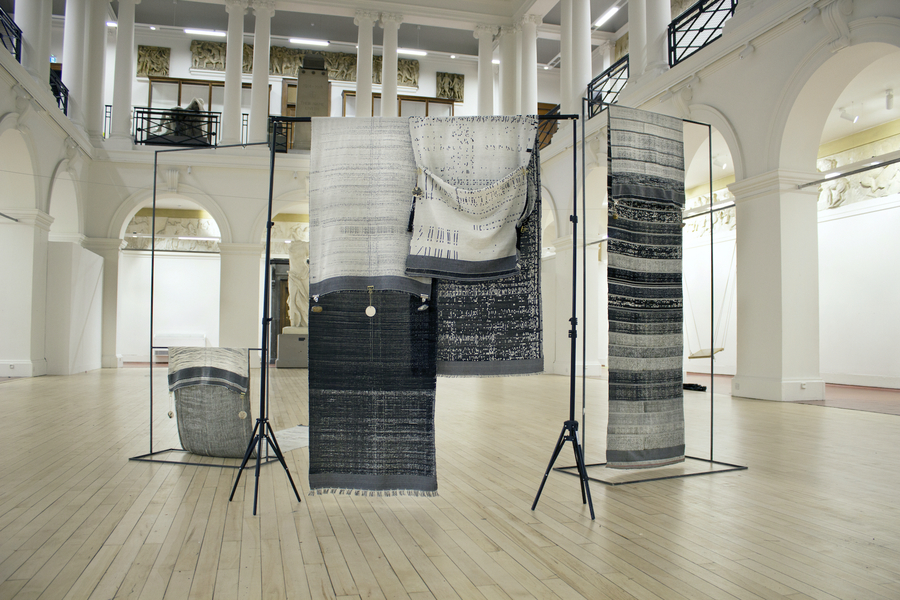
When Computers Were Women, four hand-woven Jacquard wall hangings made of recycled cotton, organic cotton and lambswool, by Crystal Bennes
Bennes’s projects often take place over an extensive time scale: previous works include a series of photographs of an artificial island in Sweden made from radioactive waste, and a five-year project to reconstruct a hay meadow based on a nineteenth century myth of plant migration from Denmark to Italy. Bennes describes their plans for Platform this year as exploring "different facets of women’s histories linked to English colonialism in early-modern Ireland (and contemporary reverberations) through some of these materials: butter, linen, paper, grass, and stones."
Rudy Kanhye, meanwhile, will present an installation of screen-prints based on imagery drawn from his Mauritian heritage. Kanhye, a visual artist, curator and culinary designer, says his work for Platform will "reflect on the politics of food, decolonisation and the economy of time through the lens of Mauritius." Kanhye’s wide reaching practice often takes place in collaboration with artists of colour, disabled artists and chronically ill artists, and operates at the intersections of racial, climate and food justice. This manifests in exhibitions, publications and public lectures.
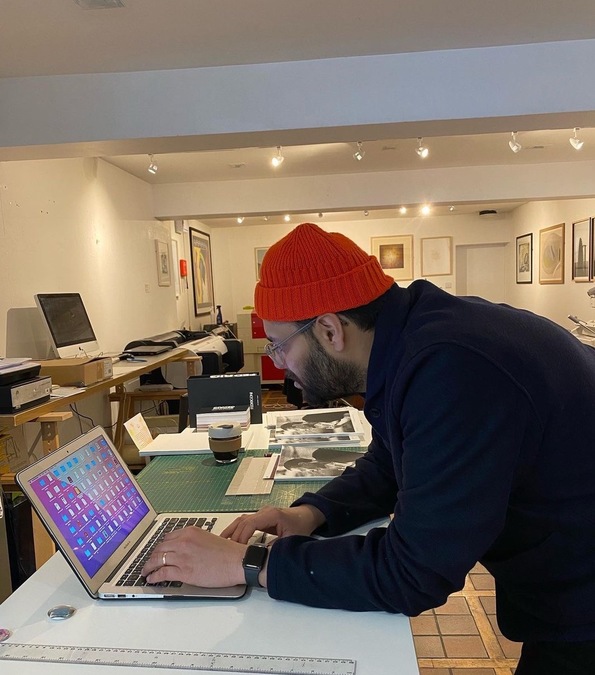
Kanhye often works as part of a newly-formed collective alongside artist Lauren Le Rose, where they investigate how activists and artists have historically worked alongside one another. For the closing weekend of the festival, he will present a durational performance that invites viewers to share food prepared by the artist in an exchange of conversation.
Richard Maguire has spent a significant period of time working with a series of letters in the National Records of Scotland. These letters detail the possessions on an estate in India belonging to a wealthy Scottish family, including a young child called Peggy Hall, who is later sent to Scotland alongside an enslaved woman. Maguire will use archival materials (including Peggy’s passage inventory to Scotland) as a method of discussing the violence of colonialism – but also the possibility of healing through fabulating and speculating counter-histories to this violence.
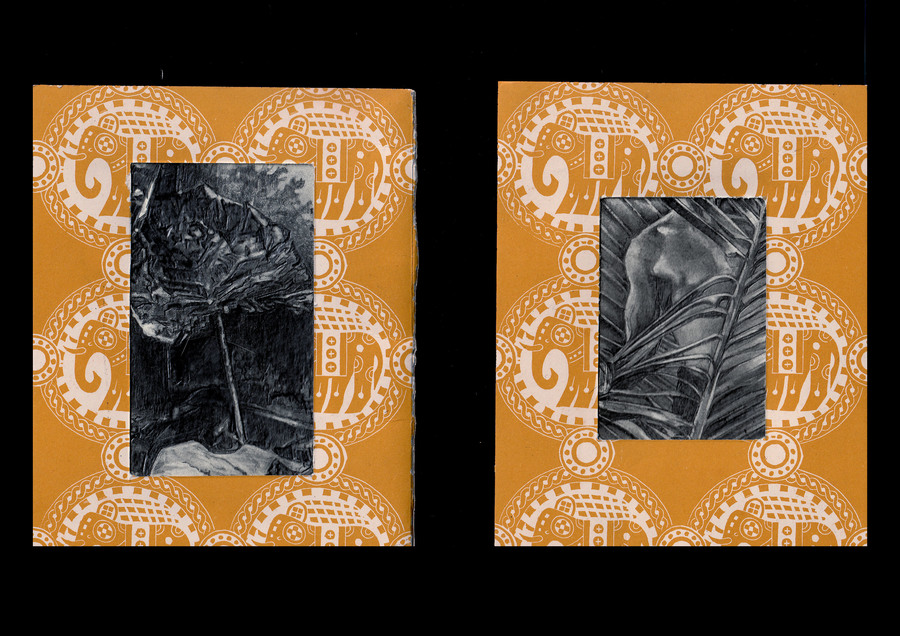
Not Everything Fades Away, Graphite on paper mounted on found paper, 15.4 x 12.4cm, 2023 by Richard Maguire. Image courtesy of Artist
The artist will consider Islamicate formations of slavery from the Indian subcontinent, where families would sometimes enslave one another to remain a family unit. Maguire often works with archives and historical figures to produce counter-narratives to the violence of colonialism, and his work for Platform promises to delve further into familial formations, miscegenation and racial identity.
The Platform announcement is just one part of the 2023 Edinburgh Art Festival programme, which features 55 projects at over 30 venues across the city from 11-27 Aug. The programme – designed to help art lovers explore the city with sections dedicated to the Old Town and Southside, New Town, West, and East & Leith – includes a host of events including a one-night return for Jupiter Rising, plus a series of collaborations with the Book and Film Festivals.
Platform 2023, Trinity Apse, Chalmers Close, 42 High Street, 11-27 Aug, open daily 10am-5pm
View the full EAF 2023 programme at edinburghartfestival.com
